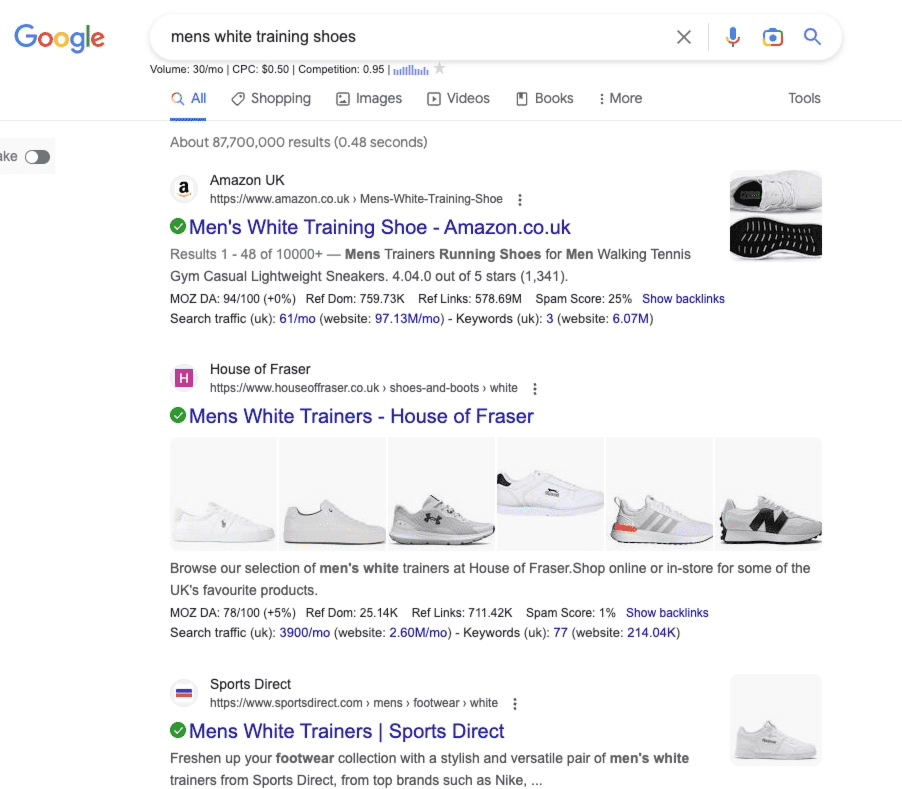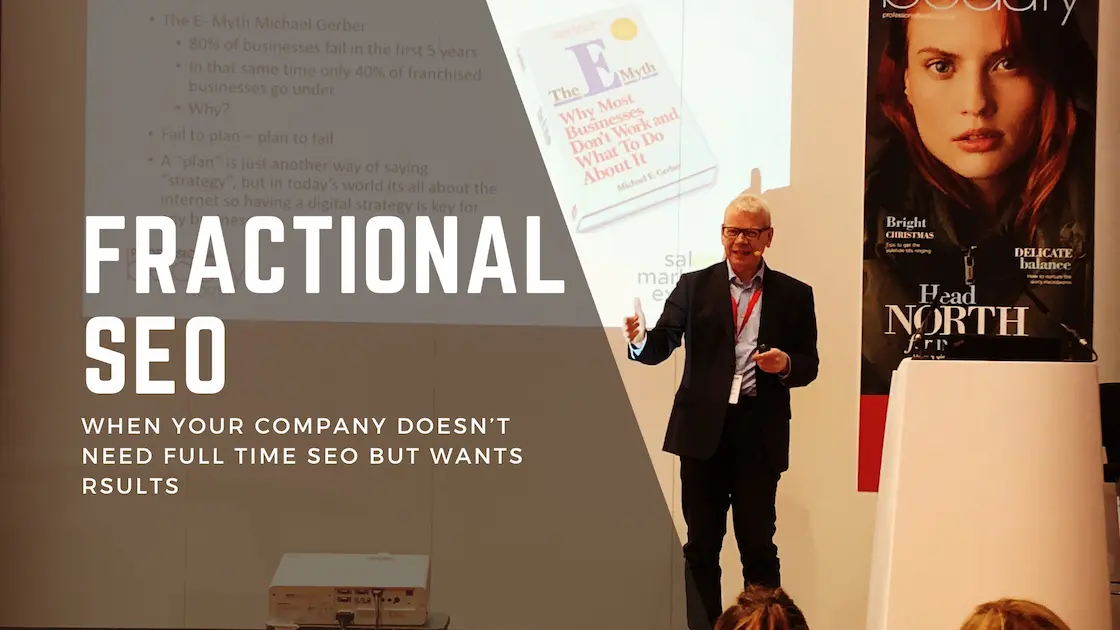In today’s highly competitive online marketplace, having a successful SEO strategy is essential for any business that wants to improve its visibility on search engines and attract more traffic and potential customers.
But what are the most important parts of an SEO strategy that works, and how can you make a clear plan that will help your website rank higher on search engines?
In this blog, I’ll take you through the key steps I use to create a successful SEO strategy for my clients as an SEO consultant.
In it I break it down by task, including, identifying target keywords, creating compelling content, optimising on-page factors, building high-quality backlinks, and monitoring and tracking results.
By following these steps, you can develop a plan that will help to improve your website’s ranking on search engines and attract more traffic and potential customers.
Naturally, I would encourage you to use an SEO professional to help implement the recommendations, as some of them require an experienced pair of hands to get the best results.
Let’s get started!
The first thing you should always consider about SEO is your audience. Whether it’s your customers, your followers or your friends who you expect to consume your content, first and foremost you need to think deeply about them and the experience they will have on your site.
If you can do this well, you’ll have a better appreciation of the type of things that they want to see from your site.
That audience knowledge has a direct correlation with SEO.
Why?
Because Google and other search engines what to give the best information and therefore best experience possible to the user.
That could be as simple as answering a quick question in the shortest possible way, such as, “what time do you open on a Thursday?” (which would be answered using your store opening times where ever you place them on your site). Alternatively, you can provide a detailed how-to post about something you’re an expert in and want to share your expertise.
Both examples above are just as valuable as each other depending on the circumstances of the reader, that is user experience
Following on from the user experience aspect of your website is keyword research. This is not only important from a search point of view but also from how you understand your audience and your market.
This is the opportunity for you to show the knowledge of your industry by thinking about specific seed words you can list which then can be used to further investigate to build a corpus of keywords you would use to generate content ideas.
Conducting keyword research with users in mind and showcasing your knowledge is obviously important because it helps to focus your website’s content and optimisation efforts on the terms and phrases that potential customers are using to search for related to your business.
By understanding the keywords that are most relevant to your brand, it becomes possible to create content around the topics that are most relevant and to optimise the website’s on-page factors in a way that will improve its ranking on search engines and, most importantly, for its audience.
The first place you’d think an SEO would start is by opening up their toolkit and letting the data do its thing, and while that is true, I’ve discovered that being able to have conversations with humans who understand the market can make a huge difference.
Depending on the client, conversations can be held with many people related to the business, including the owners, and stakeholders within the different departments, but, time and again, some of the most valuable discussions you can have are with the people who sell the products or services.
This is because people in the sales department speak with customers every day, know what’s going on, and understand the issues they’re experiencing. They also speak their language, which is a huge benefit when looking for seed keyword inspiration.
The reason why this is important is simply that sometimes your customers search for your product with different keywords than you might be able to think of, so, understanding the language they use is a real way of getting inside your customer’s heads.
Other ways I have found to be invaluable are looking at reviews, blog comments, and similar user-generated content.
Finally, before you launch any keyword campaign, the most important source of keywords is likely to be those that your site is currently being found for.
If your site is live, you should always have Google Search Console installed. This is a free Google tool that provides actual data directly from the search engine about how your website is being found and with what words and phrases. This is a gold mine of information that needs to be plucked prior to starting up any external keyword tool, which in the end will be third-party data, unlike that in GSC.
By doing these simple things before carrying out your deeper keyword research gives you a distinct advantage and can help attract more traffic and potential customers to your website.
The next step is to create compelling and relevant content for the website that is optimised for the target keywords. This could include blog posts, articles, product descriptions, and other types of content that provide value to the website’s visitors and help to improve its ranking on search engines.
Not only does this content need to be compelling, but it also needs to match the intent of the query in order to have a good chance of ranking.
What I find really important at this stage is to understand the competition and what they are doing, and what Google is rewarding.
What I mean by this is you have to look at the type of query you are targeting and try as best as possible to match the search intent and the page format of those results that are already on the first page.
So, for example, if you’re gunning for the keyword “men’s white training shoes” then you’re most likely to find that the first page of google is full of results for e-commerce stores selling those specific products.

It’s therefore important for your page to have the same format as those Google are rewarding with a similar intent.
If, for example, you wrote a blog post targeting that same keyword, you probably won’t rank on the first page of the SERPs because it doesn’t meet the intent or the format Google is expecting for that query.
In addition to creating compelling content, it’s also important to optimise the website’s on-page factors, such as the title tags, meta descriptions, header tags, and content. These elements should be optimised for the target keywords in order to improve the website’s ranking on search engines.
One important factor that I find many websites don’t understand is what to optimise and how much they should optimise and as a result become totally confused with the whole thing.
It’s quite common knowledge that the four best places to include your keyword is the URL, title tag, h1 and in the first paragraph of the content, that is SEO 101.
Beyond that, you can use supplementary keywords in other places on that same page, but that has to be associated with your main keyword.
One of the best ways to identify these supporting keywords is in the related search areas of the SERPs, you will see them at the bottom of any search results page and which Google believe are related to the main query.
By manually checking these related searches and clicking on some of the suggestions to see what other related searches Google believes are relevant, you can get a better understanding of the topic as a whole by following the breadcrumbs google is leaving.
All you need to do is to include some of those related searches as keywords in your own content, as long as it’s relevant and reads well for the user.
Another essential element of a successful SEO strategy is building high-quality backlinks from other websites. This means getting links from trustworthy and relevant websites, which can help search engines see the website as more authoritative and trustworthy.
Finally, it’s important to monitor and track the results of the SEO strategy in order to understand what is working and what is not. This can be done using tools like Google Analytics, which can provide data on the website’s traffic, rankings, and other key metrics.
Overall, this blog gives you a framework for the most important parts of a good SEO strategy. By doing these things, you can make a clear plan for how to improve your website’s ranking on search engines and get more visitors and potential customers.
having a successful SEO strategy is essential for any business that wants to improve its ranking on search engines and attract more traffic and potential customers.
By following the key steps outlined in this blog, including identifying target keywords, creating compelling content, optimising on-page factors, building high-quality backlinks, and monitoring and tracking results, it becomes possible to create a well-defined plan that will help to improve your website’s ranking on search engines and achieve success with search engine optimisation.
Don’t wait any longer – start implementing these essential elements of a successful SEO strategy today, and take your business to the next level or why not ask for a free video audit of your website?
Our audits are FREE and are personalised, manually audits delivered by video with unique insights into what an experienced SEO recommends for you to do to improve the visibility of your website and what gives you the best bang for your buck.
Enjoyed this read, there’s more. If you’re interested in what makes a good SEO consultant, you’re in luck, I wrote an post about it and what you need to look out for if you’re searching for one at the moment.



© 2007 - 2025 Black And White Boy SEO with From Blackandwhiteboy.com